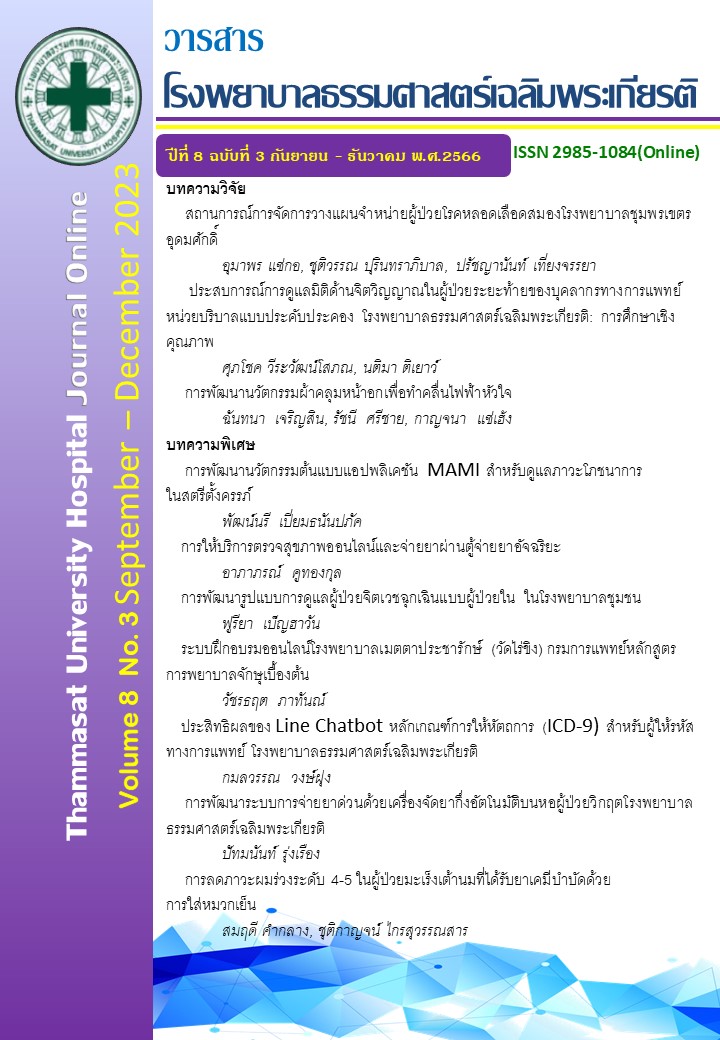ประสบการณ์การดูแลมิติด้านจิตวิญญาณในผู้ป่วยระยะท้ายของบุคลากรทางการแพทย์ หน่วยบริบาลแบบประคับประคอง โรงพยาบาลธรรมศาสตร์เฉลิมพระเกียรติ: การศึกษาเชิงคุณภาพ
คำสำคัญ:
มิติด้านจิตวิญญาณ, การดูแลแบบประคับประคอง, บุคลากรทางการแพทย์บทคัดย่อ
บทนำ: การดูแลมิติทางจิตวิญญาณในผู้ป่วยระยะท้าย เป็นสิ่งสำคัญ แต่ยังไม่พบมีการศึกษาเกี่ยวกับประสบการณ์ของบุคลากรทางการแพทย์ในการให้การดูแลมิติดังกล่าวในบริบทของสังคมและวัฒนธรรมประเทศไทย
วัตถุประสงค์: ศึกษาประสบการณ์การดูแลมิติด้านจิตวิญญาณในประเด็นการรับรู้ ตอบสนองต่อความต้องการ และผลกระทบจากการดูแลผู้ป่วยของบุคลากรทางการแพทย์ ที่ปฏิบัติงานในหน่วยบริบาลแบบประคับประคอง โรงพยาบาลธรรมศาสตร์เฉลิมพระเกียรติ
วิธีการดำเนินงานวิจัย: งานวิจัยนี้เป็นการวิจัยเชิงคุณภาพ เก็บข้อมูลด้วยการสัมภาษณ์เชิงลึกแบบกึ่งโครงสร้าง(semi-structured interview) เลือกกลุ่มตัวอย่างแบบเจาะจง คือบุ คลากรทางการแพทย์หน่วยบริบาลแบบประคับประคอง จำนวน 12 คน ประกอบด้วย อาจารย์แพทย์ 4 คน แพทย์ประจำบ้าน 4 คน และพยาบาล 4 คน ตรวจสอบความน่าเชื่อถือด้วยวิธีการความน่าเชื่อถือได้(credibility) การยืนยัน(conformability)ทุกขั้นตอนของการเก็บรวบรวมข้อมูลตลอดจนการวิเคราะห์ข้อมูล และการตรวจสอบความเที่ยงขอข้อมูล(reliability)
ผลวิจัย: บุคลากรทางการแพทย์หน่วยบริบาลแบบประคับประคองมีประสบการณ์การดูแลมิติด้านจิตวิญญาณเป็น 5 ประเด็น ได้แก่ ประเด็นที่ 1 การรับรู้ความหมายมิติด้านจิตวิญญาณ พบว่า ความต้องการมิติด้านจิตวิญญาณของผู้ป่วยระยะท้าย คือ ความต้องการหรือความปรารถนาลึก ๆ สิ่งที่สำคัญในวาระสุดท้าย ความรัก ความสุข และการได้ปฏิบัติตามหลักศาสนา และการประเมินเพื่อเข้าถึงมิติจิตวิญญาณของผู้ป่วย ใช้การพูดคุยตั้งคำถาม ใช้ใจในการประเมินและรับรู้ด้วยใจ ประเด็นที่ 2 อุปสรรคต่อการให้การดูแลมิติทางจิตวิญญาณ คือ ความเป็นนามธรรม นิยามของคำว่าจิตวิญญาณที่มีความคลุมเครือไม่ชัดเจน และกังวลกับการรับมือกับอารมณ์ท่วมท้นของผู้ป่วยได้ยาก ประเด็นที่ 3 ประสบการณ์การตอบสนองเพื่อดูแลความต้องการมิติด้าน
จิตวิญญาณเป็น 2 ลักษณะคือ ตอบสนองโดยการเอื้อให้ความต้องการของผู้ป่วยเกิดขึ้น และตอบสนองในลักษณะให้การรับฟังด้วยความเห็นอกเห็นใจ ประเด็นที่ 4 ประสบการณ์ในฐานะผู้บริบาลทางจิตวิญญาณ รู้สึกสุข สงบ ปล่อยวาง ภาคภูมิใจในวิชาชีพ ประเด็นที่ 5 การพัฒนาทักษะการดูแลทางจิตวิญญาณ พัฒนาทีมและระบบอย่างต่อเนื่อง โดยพัฒนาการตระหนักรู้ ทั้งเรื่องความสำคัญของการดูแลมิติทางจิตวิญญาณ และตระหนักรู้ในตนเอง หมั่นทบทวนว่าตนเองยังขาดอะไร พัฒนาการเรียนรู้และทักษะการสื่อสารของตนเอง มีเวทีในการแลกเปลี่ยนเรียนรู้สม่ำเสมอ พัฒนานิยามที่ชัดเจน แนวทางการในดูแลมิติทางจิตวิญญาณ
สรุป: ประสบการณ์การดูแลมิติด้านจิตวิญญาณในผู้ป่วยระยะท้ายของบุคลากรทางการแพทย์หน่วยบริบาลแบบประคับประคอง เป็นประสบการณ์ที่สำคัญและมีความหมายสำหรับบุคลากร ทำให้เกิดการรับรู้ในคุณค่าในวิชาชีพและการเติบโตภายในของบุคลกร ดังนั้น การพัฒนาระบบการดูแลทางจิตวิญญาณในผู้ป่วยระยะท้าย ควรให้การพัฒนาทั้งการตระหนักรู้ในตนเอง การสื่อสาร การเรียนรู้กันในทีม และระบบงานที่เอื้อต่อการดูแลมิติทางจิตวิญญาณในผู้ป่วยระยะท้าย เพื่อตอบสนองได้ตรงตามความต้องการการดูแลมิติด้านจิตวิญญาณของผู้ป่วยระยะท้ายและครอบครัวในบริบทของสังคมและวัฒนธรรมไทยต่อไป
เอกสารอ้างอิง
บุษยามาส ชีวสกุลยง และคณะ. การดูแลผู้ป่วยแบบประคับประคอง. พิมพ์ครั้งที่ 1. เชียงใหม่: กลางเวียงการพิมพ์; 2556.
สำนักงานคณะกรรมการสุขภาพแห่งชาติ. นิยามปฏิบัติการ (Operational definition) ของคำที่เกี่ยวข้องกับ เรื่องการดูแลแบบประคับประคอง (Palliative care) สำหรับประเทศไทย พ.ศ. 2563 [อินเตอร์เน็ต]. เข้าถึงได้จาก:https://www.thailivingwill.in.th/sites/default/files/Operational_definition_Palliative_care.pdf
Anandarajah G, Hight E. Spirituality and medical practice: using the HOPE questions as a practical tool for spiritual assessment. Am Fam Physician. 2001; 63(1):81-9.
ชนุกร แก้วมณี. แนวคิดและวิธีการประเมินความต้องการด้านจิตวิญญาณของผู้ป่วยมะเร็ง. วารสารพยาบาลกระทรวงสาธารณสุข. 2562; 29(1):1-10.
พัชรีย์ พรหมสิงห์, ภาวนา กีรติยุตวงศ์, วัลภา คุณทรงเกียรติ. ปัจจัยที่มีความสัมพันธ์กับการดูแลด้านจิตวิญญาณในผู้ป่วยระยะท้ายของพยาบาลวิชาชีพ. รามาธิบดีพยาบาลสาร. 2559; 22(3):277-92.
วาสินี วิเศษฤทธิ์, รังสิมันต์ สุนทรไชยา, พิไลพร สุขเจริญ. การพัฒนาและทดสอบเครื่องมือประเมินความต้องการดูแลด้านจิตวิญญาณสำหรับผู้ป่วยระยะท้ายในบริบทวัฒนธรรมไทย. วารสารวิทยาลัยพยาบาลบรมราชชนนี กรุงเทพ. 2562; 35(1):163-74.
ชาย โพธิสิตา. ศาสตร์และศิลป์แห่งการวิจัยเชิงคุณภาพ. พิมพ์ครั้งที่ 8. กรุงเทพฯ: อมรินทร์พริ้นติ้งแอนด์พับลิชชิ่งจำกัด; 2562.
ระวีวรรณ พิไลยเกียรติ, จินตนา ฤทารมย์, ธัญชนก บุตรจันทร์. การดูแลด้านจิตวิญญาณในผู้ป่วยเรื้อรัง : ประสบการณ์ของพยาบาลวิชาชีพ. วารสารสภาการพยาบาล. 2552; 24(1):62-76.
สุมิตรา ติระพงศ์ประเสริฐ, นิภาวรรณ สามารถกิจ, วิภา วิเสโส. ปัจจัยที่มีความสัมพันธ์กับความต้องการด้านจิตวิญญาณในผู้ป่วยมะเร็งระยะประคับประคอง. วารสารคณะพยาบาลศาสตร์ มหาวิทยาลัยบูรพา. 2564; 29(1):67-79.
Soto-Rubio A, Perez-Marin M, Rudilla D, Galiana L, Oliver A, Fombuena M, Barreto P. Responding to the spiritual needs of palliative care patients: A Randomized Controlled Trial to test the effectiveness of the KIDO Therapeutic Interview. Front Psychol. 2020; 11:1979. Doi:10.3389/fpsyg.2021.674453
So H, Mackenzie L, Chapparo C, Ranka J, McColl MA. Spirituality in Australian Health Professional Practice: A Scoping Review and Qualitative Synthesis of Findings. J Relig Health. 2023; 62:2297-2322.
Balboni TA, Fitchett G, Handzo GF, Johnson KS, Koenig HG, Pargament KI, Puchalski CM, Sinclair S, Taylor EJ, Steinhauser KE. State of the Science of Spirituality and Palliative Care Research Part II: Screening, Assessment, and Interventions. J Pain Symptom Manage. 2017; 54(3):441-453.
Nissen RD, Viftrup DT, Hvidt NC. The process of spiritual care. Front Psychol. 2021; 12:674453.Doi: 10.3389/fpsyg.2021.674453
พิณนภา แสงสาคร. การสังเคราะห์องค์ความรู้เกี่ยวกับสุขภาวะทางจิตวิญญาณในบริบทของสังคมไทย[วิทยานิพนธ์ดุษฎีบัณฑิต]. กรุงเทพฯ:มหาวิทยาลัยศรีนครินทรวิโรฒ. 2554.
Zumstein-Shaha M, Ferrell B, Economou D. Nurses’ response to spiritual needs of cancer patients. Eur J Oncol Nurs. 2020; 48:101792.
Chahrour WH, Hvidt NC, Hvidlt EA, Viftrup DT. Learning to care for the spirit of dying patients: the impact of spiritual care training in a hospice-setting. BMC Palliat Care. 2021; 20:115.
ผานิต หลีเจริญ. การดูแลผู้ป่วยระยะท้าย: สะท้อนคุณค่าของวิชาชีพ. วารสาร มฉก.วิชาการ. 2557; 17(37):127-138.
Miller M, Addicott K, Rosa WE. Spiritual care as a core component of palliative nursing. Am J Nurs. 2023; 123(2):54-9.
Connerton CS, Moe CS. The Essence of Spiritual care. Creative Nursing. 2018; 24(1):36-41.
ดาวน์โหลด
เผยแพร่แล้ว
รูปแบบการอ้างอิง
ฉบับ
ประเภทบทความ
สัญญาอนุญาต
ลิขสิทธิ์ (c) 2023 วารสารโรงพยาบาลธรรมศาสตร์เฉลิมพระเกียรติ

อนุญาตภายใต้เงื่อนไข Creative Commons Attribution-NonCommercial-NoDerivatives 4.0 International License.



